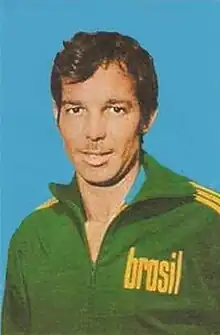 Roberto with Brazil at the 1970 FIFA World Cup | |||||||||||||||||
| Personal information | |||||||||||||||||
|---|---|---|---|---|---|---|---|---|---|---|---|---|---|---|---|---|---|
| Full name | Roberto Lopes de Miranda | ||||||||||||||||
| Date of birth | 31 July 1943 | ||||||||||||||||
| Place of birth | Niterói, Brazil | ||||||||||||||||
| Position(s) | Midfielder, Forward | ||||||||||||||||
| Senior career* | |||||||||||||||||
| Years | Team | Apps | (Gls) | ||||||||||||||
| 1962–1970 | Botafogo | 351 | (153) | ||||||||||||||
| 1971–1973 | Flamengo | 11 | (3) | ||||||||||||||
| 1973–1976 | Corinthians | 77 | (21) | ||||||||||||||
| Total | 439 | (177) | |||||||||||||||
| International career | |||||||||||||||||
| 1967–1970 | Brazil | 12 | (6) | ||||||||||||||
Medal record
| |||||||||||||||||
| *Club domestic league appearances and goals | |||||||||||||||||
Roberto Lopes de Miranda, sometimes known as just Roberto (born in Niterói, Rio de Janeiro State, 31 July 1943)[1] is a former association footballer who played as a midfielder or striker. His nickname was "Vendaval" (meaning: Gale).
Throughout his career (1962–1976) he played for Botafogo, Flamengo, Corinthians and América. He won two Rio de Janeiro State Championship (1967, 1968) and one Brazilian Cup in 1968. For the Brazilian national team he played 12 games between 1968 to 1972 and scored 6 goals. He was also part of the team that won the 1970 FIFA World Cup, playing in two matches.[2]
Together with Jairzinho, Robert Miranda formed a potent strike force which helped Botafogo to win the Rio (Carioca) Championship consecutively in 1967 and 1968. Roberto was a forthright striker much loved by the Botafogo supporters.
In the 1960s, Santos of Pelé, Coutinho, Zito, Edu etc. and Botafogo of Zequinha, Gérson, Jairzinho, Roberto Miranda and Paulo Cesar were the two best teams in Brazil. Botafogo supporters believe that this attack is one of the best attacks of all time in world football history.
Roberto Miranda left Botafogo to play in Mexico. He may have played for other teams but he will always be best known as a Botafogo striker.
Honours
Botafogo
- Campeonato Brasileiro: 1968
- Campeonato Carioca: 1962, 1967, 1968
- Torneio Rio – São Paulo: 1964, 1966
- Torneio de Caracas: 1967, 1968, 1970[3]
Brazil
References
- ↑ "Roberto Miranda". Olympedia. Retrieved 12 April 2022.
- ↑ Roberto Miranda – FIFA competition record (archived)
- ↑ Pequeña Copa del Mundo and Other International Club Tournaments in Caracas Archived October 9, 2022, at the Wayback Machine. rsssf.org
External links
- Roberto Miranda at FIFA (archived)
- Roberto Miranda at FootballDatabase.eu
- Roberto Miranda at National-Football-Teams.com
- Roberto Miranda at Olympedia